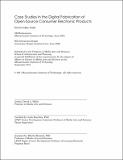| dc.contributor.advisor | Leah Buechley. | en_US |
| dc.contributor.author | Mellis, David Adley | en_US |
| dc.contributor.other | Massachusetts Institute of Technology. Dept. of Architecture. Program in Media Arts and Sciences. | en_US |
| dc.date.accessioned | 2012-03-16T14:42:46Z | |
| dc.date.available | 2012-03-16T14:42:46Z | |
| dc.date.copyright | 2011 | en_US |
| dc.date.issued | 2011 | en_US |
| dc.identifier.uri | http://hdl.handle.net/1721.1/69675 | |
| dc.description | Thesis (S.M.)--Massachusetts Institute of Technology, School of Architecture and Planning, Program in Media Arts and Sciences, 2011. | en_US |
| dc.description | This electronic version was submitted by the student author. The certified thesis is available in the Institute Archives and Special Collections. | en_US |
| dc.description | Cataloged from PDF version of thesis. | en_US |
| dc.description | Includes bibliographical references (p. 67-69). | en_US |
| dc.description.abstract | This thesis explores the effects of digital fabrication on the design, production, and customization of consumer electronic devices. It does so through a series of three case studies - a radio, a pair of speakers, and a computer mouse - that combine a custom electronic circuit board with a digitally-fabricated (laser-cut or 3D-printed) enclosure. For each case study, the thesis describes the construction and prototyping of the product and a workshop in which participants modified the design and made the device for themselves. This customization was enabled by the sharing of the design files for the products following the principles and practices of open-source. The case studies are used to draw practical lessons about the application of electronics, the laser-cutter, and the 3D printer in the digital fabrication of consumer electronic products. Implications are drawn for the open-sourcing of each of these elements and for the software tools used to the design them. The case studies also illustrate four modes of production that digital fabrication enables for electronic devices: one-off, artisanal, kit, and a hybrid mass/custom production. Additionally, they shed light on the types of customization and the human roles that digital fabrication implies for consumer electronics. Three main themes emerge: diversity in design and production, personal connection with devices, and leveraging of the power of software for the making of hardware. | en_US |
| dc.description.statementofresponsibility | by David Adley Mellis. | en_US |
| dc.format.extent | 71 p. | en_US |
| dc.language.iso | eng | en_US |
| dc.publisher | Massachusetts Institute of Technology | en_US |
| dc.rights | M.I.T. theses are protected by
copyright. They may be viewed from this source for any purpose, but
reproduction or distribution in any format is prohibited without written
permission. See provided URL for inquiries about permission. | en_US |
| dc.rights.uri | http://dspace.mit.edu/handle/1721.1/7582 | en_US |
| dc.subject | Architecture. Program in Media Arts and Sciences. | en_US |
| dc.title | Case studies in the digital fabrication of open-source consumer electronic products | en_US |
| dc.type | Thesis | en_US |
| dc.description.degree | S.M. | en_US |
| dc.contributor.department | Program in Media Arts and Sciences (Massachusetts Institute of Technology) | |
| dc.identifier.oclc | 777964403 | en_US |
